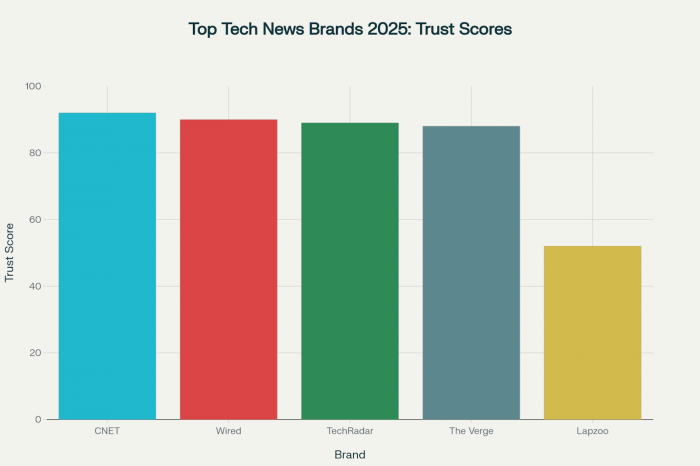When a website looks this polished, your first instinct is to trust it. But what happens when a promising new tech platform becomes the subject of overnight controversy? That’s the question I set out to answer after Lapzoo.com appeared in several search results this year, presenting itself as a modern hub for smart tech insights and digital innovation.
At first glance, it’s everything a credible site should be: a clean interface, fast loading speed, and articles on trending technologies. But the deeper I looked, the more questions surfaced.
The Shiny Facade, And the Uneasy Questions Behind It
Lapzoo brands itself as a digital future guide, yet the absence of an “About Us” page immediately stood out. No founder names. No editorial team. No company registration details. In 2025, that’s not just odd, it’s a major transparency gap.
For context, most reputable tech platforms like CNET, Wired, and TechRadar display their editorial teams, policies, and press contacts publicly. Lapzoo offers none of these. There’s no verifiable ownership data in WHOIS or any public business registry either.
This doesn’t automatically mean it’s a scam, but it does make it difficult to trust its motives or content standards. The missing human touch, the sense that someone accountable is behind the words, leaves a vacuum that no glossy design can fill.
Behind the Content: Familiar Words, Little Depth
Once I began reading Lapzoo’s articles, another pattern emerged. The tone was generic. Many pieces recycled phrasing from other tech blogs, often summarizing known information without fresh analysis or cited sources.
There were no author bylines or timestamps indicating when the content was updated. No expert interviews, data charts, or case studies, just surface-level commentary. While that can appeal to casual readers who prefer simple explainers, it also raises the risk of misinformation when no verification process exists.
Some readers on tech forums described Lapzoo’s content as “decent for beginners but too vague for serious decisions.” That assessment felt accurate.
Comparing Lapzoo with Trusted Tech Media
To see where Lapzoo really stands, I compared it with leading tech outlets. CNET, Wired, and TechRadar are known for strict editorial policies, review testing, and author accountability. Each article on those platforms links to methodology notes or external references.
Lapzoo, by contrast, offers ease of navigation but no authority signals — no Trustpilot rating, no third-party recognition, and no active discussion on Reddit or major forums. It’s an island in the tech ecosystem, visible but isolated.
| Platform | Transparency | Editorial Policy | Verified Reviews | Author Bios |
| Lapzoo.com | Hidden ownership | None displayed | Absent | Anonymous |
| CNET | Public company info | Detailed | Yes | Named writers |
| Wired | Clear ownership | Transparent | Yes | Named writers |
| TechRadar | Accessible editors | Listed | Yes | Named writers |
What the Tech Community Thinks
When I started exploring Reddit threads, Discord groups, and small tech communities, I found mixed opinions. Some users liked Lapzoo’s clean layout and quick reads. Others were skeptical of its anonymous nature and lack of fact-checking.
There’s no record of scam activity tied to the domain, but there’s also no loyal audience backing it. It exists in a gray zone, not fraudulent, but not fully credible either.
One user summed it up perfectly:
“Easy reads, but hard to trust for big decisions.”
Protecting Yourself from Unverified Tech Sites
Lapzoo is far from the first sleek site to raise credibility concerns. The formula is common: attractive UX, broad topics, and SEO-friendly titles — but little proof of expertise.
If you ever land on a new tech site and aren’t sure it’s credible, here are five red flags to look for:
- No visible ownership or team details.
- Missing editorial or privacy policy.
- No external citations or references.
- No user reviews or community presence.
- Vague or reused content without attribution.
Better Alternatives for Reliable Tech Insights

If your goal is to learn about technology safely and accurately, always benchmark new blogs against reputable players. Platforms like CNET, Wired, The Verge, and TechRadar have transparent ownership, real journalists, and industry recognition.
They also undergo editorial review processes and maintain fact-checking standards that can be verified publicly.
People Also Ask
Is Lapzoo.com a scam?
There’s no direct evidence of scam activity, but the lack of ownership details and editorial accountability means you should treat its advice cautiously.
Who runs Lapzoo.com?
As of October 2025, there’s no public information on ownership or editorial leadership — a critical missing trust factor.
Can I trust Lapzoo’s product reviews?
The articles are readable but lack depth and original research. Cross-verify any product recommendation before acting on it.
Where else should I read tech news?
Visit CNET, Wired, TechRadar, and The Verge — each has DA 85+, verified editorial teams, and a reputation for balanced reporting.
Wrap-Up: Curiosity Is Good. Blind Trust Isn’t.
The internet thrives on discovery, but curiosity should always walk hand in hand with skepticism. Lapzoo.com is a reminder that design can impress, but transparency builds trust.
Until the platform reveals its ownership, editorial policy, and verification standards, it’s best viewed as a lightweight read, not a source for critical tech decisions.
Stay informed. Stay skeptical. And remember: the most polished sites aren’t always the most credible.
Post Comments
Be the first to post comment!
Table of Content
- The Shiny Facade, And the Uneasy Questions Behind It
- Behind the Content: Familiar Words, Little Depth
- Comparing Lapzoo with Trusted Tech Media
- What the Tech Community Thinks
- Protecting Yourself from Unverified Tech Sites
- Better Alternatives for Reliable Tech Insights
- People Also Ask
- Wrap-Up: Curiosity Is Good. Blind Trust Isn’t.
- Comments
- Related Articles




